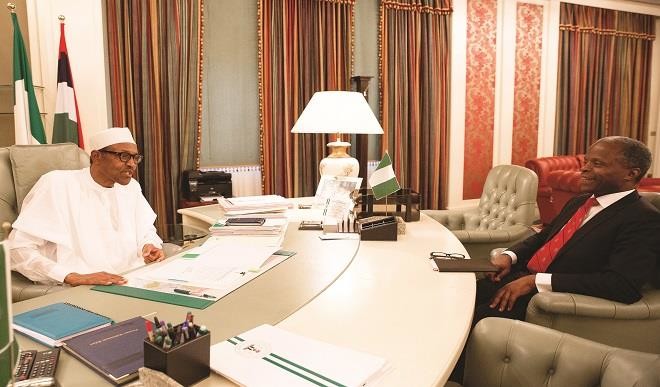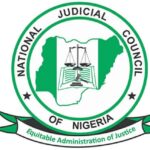
Apparently without knowing it, some spin doctors working officially or unofficially for President Muhammadu Buhari oftentimes betray some nervousness or even jitters by the way they rise to the defence of their principal even when there is absolutely no need for it. But they do it routinely as if it has become part of the rituals attendant on his medical vacation abroad.
I have in mind the planted and therefore unattributed stories that made the round at the weekend in some newspapers, including the Sunday Punch and The Nation. The objective was to clear the air over an impression of some crack in the administration.
The impression had been created by those eager to compare the president’s performance and his style with that of the acting president each time the former vacates his seat for the latter, either in search of medical attention or simply to cool off his nerves which seem to have been jaded by an unholy combination of trouble makers and defectors in the legislative arm not to mention the rampaging herdsmen and other assorted armed bandits who are not in the mood for a respite or cease fire.
The comparison this time around, patently unnecessary and uncalled for, has to do with the speed with which the sack of Lawal Daura as the director general of the Department of Security Service, DSS was effected. His sacking was one of the decisions taken by Professor Yemi Osinbajo while acting as president.
As if to play down the decisiveness of the acting president and to erase any impression that Osinbajo was a lone ranger on duty, the reports in question said the decision to do away with Daura’s service had been taken by the president and his deputy two weeks before his vacation. And, may God be praised, it was a joint decision by the duo of President Buhari and Professor Osinbanjo. Somehow the president demurred. According to the reports, President Buhari didn’t do anything because he bowed to some extraneous influence. In plain language, some unidentified influential backers of the sacked DG rallied together to frustrate the plan.
The spin doctors apparently were labouring this hard to convince the doubting public that it wasn’t what they thought of President Buhari, that the insinuation that the President, who had earlier confessed cheerfully that he was not in a hurry to do things, would not have sacked Daura was baseless.
But despite the antics of the so-called influential backers, Daura eventually lost his job. His cup, in a manner of speaking, was full to the brim when he despatched his operatives to commit sacrilege by invading the National Assembly Complex in a manner suggesting a mild coup against one of the three arms of a democratic government.
In taking the decision to fire Daura, the acting president, despite the fact that he had been conferred with full powers of the president to act as president, it stands to reason that Professor Osinbajo couldn’t have gone solo in sacking the man with influential backers. In today’s complex world with its web of intricacies and intrigues, any one with even a nodding acquaintance with the elements of good governance and collective responsibility would know that consultation remains one of the cardinal principles of public administration.
Professor Osinbajo, it is pretty safe to assume, knows enough to know this and in carrying out his duties, he is not blind to the need for consultation. The decision to overhaul the dreaded SARS, for instance, couldn’t, in my view, have been taken without consultation with President Buhari while he was away in the cool ambience of London, his own equivalent of America’s Camp David.
In the same vein, setting up a committee to work out the modalities to decentralise the functions of Nigeria Police, as if to find a mid-way between outright state police as widely canvassed and the centralised police authorities as we have, is not a decision to be taken casually.
I can even bet with the last kobo in my pocket that all these landmark decisions were taken not as if Professor Osinbajo and Co were unmindful of the fact that the substantive president – ever cautious and deeply reflective – would be back sooner or later to his duty post and supervise their implementation.
The same scenario played out while the president was away on vacation in London last year. And the same rituals were performed to the fullest. As it has become customary, his deputy, Professor Osinbajo acted as president. On that occasion as on the previous ones, the acting president demonstrated commendable leadership qualities by the exemplary way he held the reigns in President Buhari’s absence.
His sterling performance won the admiration of the citizens including, surprisingly, the sworn enemies of the administration. His foray into the Niger Delta Region helped a great deal to calm the restiveness of the oil pipe blowing militants and secured the needed respite from other angry youths. But as it turned out, the Niger Delta Initiative was not solely the idea of the VP. It had all been worked out between him and his boss before the president took off.
Sensing mischief on the part of those who sought to use the occasion to draw a wedge between the president and the vice-president, Babafemi Ojodu, special adviser on political matters, rose to the occasion in March last year, to clarify matters. His intervention was more direct than the efforts of last week’s unnamed spin doctors.
Ojodu, who appeared to be in the picture, said he was a witness to the directive from Buhari to his deputy. Speaking to the Trust, Ojodu said: “the president called the vice-president and said that I am giving you the mandate. Go into the Niger Delta and meet with everyone who is a stake holder, all the communities, talk to the militants and make sure you solve this problem for the benefit of all Nigerians.” Osinbajo dutifully carried out the directive. He went, he saw and he conquered. And the president, from far away London, was delighted.
The president was equally delighted with Osinbajo’s management of the economy especially during the recession when the naira was at the mercy of the almighty dollar. In the contest in which the naira and the dollar were unevenly matched, Osinbajo, as acting president, ordered the CBN governor to intervene. The central bank gave 500 million dollars to the commercial banks as part of the strategy to stem the fall of the naira. This, plus other measures, signalled the technical exit of the country from its corruption – inflicted recession.
The long and short of this intervention today is that there is only one administration – the Buhari administration. And the vice-president is part and parcel of that administration though at the end of it all, the buck stops on Buhari’s desk.
There is therefore no point, except for purpose of mischief, to compare the style of the two gentlemen. The beauty of pairing is not merely that one should serve as spare tyre but so that one’s virtue can, if need be, assuage the other person’s weakness.
Three years after the consummation of the union, it should be clear to Nigerians that the marriage between Buhari and Osinbajo initially dubbed by blind critics as satanic combination, has proved worthwhile. Indeed, it has worked admirably well. Mischief makers should leave them alone and find other spheres to operate.
And the president’s spin doctors should be cautious about how they jump at any and every criticism – unless they too want to create the impression that there is no smoke without fire.

 Join Daily Trust WhatsApp Community For Quick Access To News and Happenings Around You.
Join Daily Trust WhatsApp Community For Quick Access To News and Happenings Around You.

